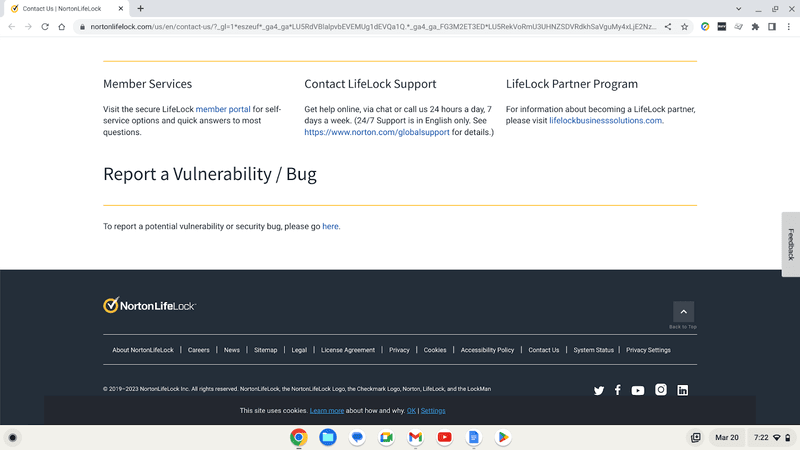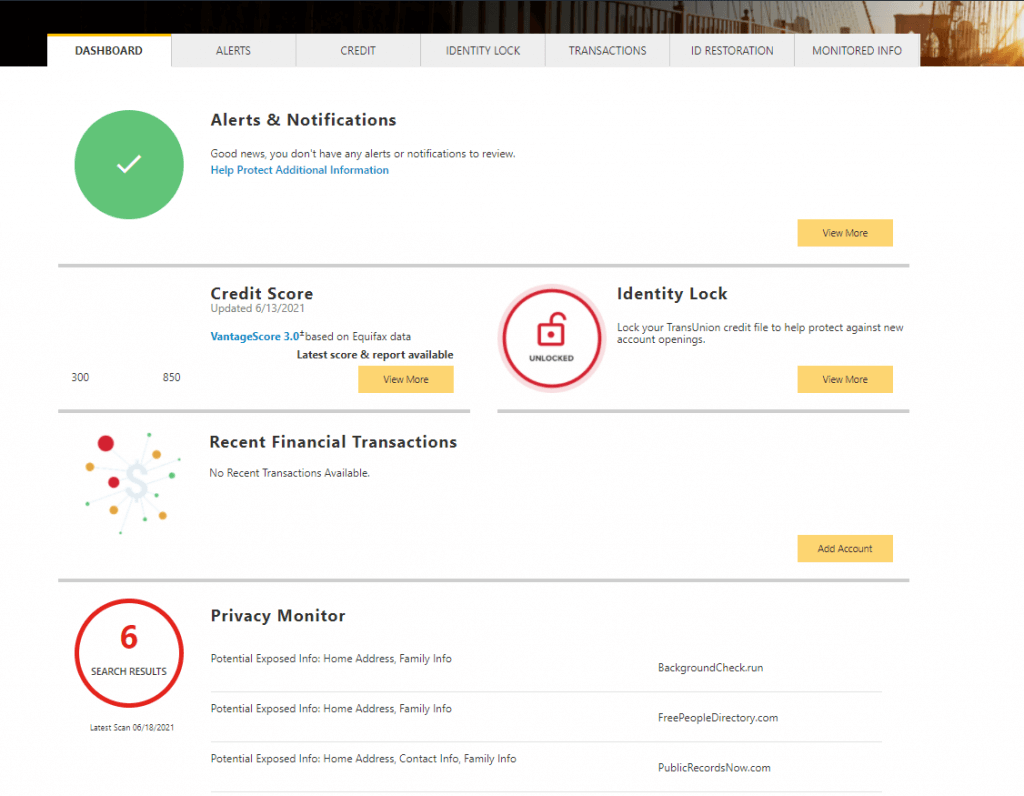IdentityForce vs LifeLock – You Should Get This Instead…
If you’re shopping for identity theft protection, you should look at Aura first.
They offer the best monitoring and threat detection, top-notch customer service, and $5 million in insurance coverage. Better yet, they don’t increase their price year after year (like another service we’re about to discuss).
I took both IdentityForce and LifeLock for a thorough test drive, and I can say IdentityForce wins the LifeLock vs. IdentityForce competition without question.
But that’s not saying much.
As you’re about to see, neither of these services hit the ball out of the park.
You can lock in our OFF discount on Aura for life, today!

Why You Should Get Aura:
- You want the Best Threat Monitoring Alerts.
- You want up to $5M Theft Insurance on Aura’s Family Plan.
- You value the 24/7/365 US-based Customer Care that Aura offers
- You want the most identity theft protection value for your buck


- You want good threat detection and monitoring services.
- You want their stand-out feature, the ChildWatch social media suite.
- You don’t care about extras like antivirus software.
- You are mainly interested in Norton’s antivirus protection and don’t care about identity theft protection
- You want the cheapest individual plan with minimal benefits
- You don’t mind LifeLock increasing your price after the first year
If you insist on seeing the IdentityForce vs. LifeLock breakdown, read on. Or, if you want to save some time, check out Aura and leave these two subpar services behind.
IdentityForce vs. LifeLock: Head-to-Head Comparison
When I put IdentityForce vs. LifeLock side-by-side, it became clear —neither offers everything I want to see in an identity protection service.
While IdentityForce offers on-point monitoring and threat detection, their dashboard is a little clunky, their family plans are difficult to sign up for, and they don’t offer additional features like antivirus software.
LifeLock has a user-friendly interface and comes with some phenomenal extras, but its threat detection and monitoring are subpar. Plus, LifeLock’s customer service leaves a lot to be desired.
I’ll explain all of this in detail below, but now you know why I recommend Aura over both of these options. Aura succeeds where LifeLock and IdentityForce fail.
Still, I promised you a detailed, head-to-head comparison. So, let’s dive in.
Editor’s Ranking Table
 |  | ||
Overall Score | |||
Monitoring & Alerts |
|
|
|
Threat Resolution |
|
|
|
Theft Insurance Per Adult |
|
|
Only Ultimate Plus offers $1M coverage |
Customer Support |
|
|
|
Additional Services |
|
|
|
Cost |
|
|
|
Renewal Price Increased After 1st Year? |
|
|
|
Promo Code |
Monitoring and Alerts: Winner – IdentityForce
IdentityForce comes out ahead here by a long shot.
Both LifeLock and IdentityForce offer a wide breadth of monitoring services, including:
However, only IdentityForce seems to actually catch security threats (more on that below).
I do have to give LifeLock credit where credit is due. Their monitoring service may not be the highest quality, but it comes with a few extras IdentityForce doesn’t offer— like home title monitoring and credit freeze services.
If you could combine IdentityForce’s alert detection with some of LifeLock’s extra features, you’d have a great identity protection service.
Oh wait, that already exists— it’s called Aura.
But I digress. Let’s dig into the details of LifeLock and IdentityForce’s monitoring services.
Dark Web Monitoring
After signing up and entering my information, I expected LifeLock to come up with the same twenty or so alerts that nearly every identity protection service finds on me.
So, imagine my surprise when it found one.
That’s it, one measly dark web alert.
Needless to say, my suspicions were raised. I thought, maybe, it’s just a bit slow. LifeLock frames itself as a high-quality service—maybe it moves slowly to avoid giving duplicate or false alerts?
Nope.
Two weeks later, it had only uncovered six threats. And they were the easiest threats to find regarding issues with my name, address, and phone number. It missed several data breach alerts I expected to see even after two solid weeks of scanning the internet.
IdentityForce, on the other hand, found 19 threats within minutes of receiving my information. That’s more in line with what I expect from a good protection service.
While only seven of the 19 turned out to be unique alerts, at least IdentityForce does its job.
Alerts Dashboard
LifeLock may not stand up to the test, but it looks like it does.
Its alerts dashboard is streamlined and simple, making it easy to use. I think that’s part of why so many people still opt for it. It might not be alerting you to everything it should, but at least it looks top-notch.
IdentityForce, meanwhile, doesn’t have a bad dashboard, per se. It’s just not stellar. It’s a little cluttered, and the alerts are repetitive. Getting a rapid succession of notifications that all read “email address monitoring alert” sort of desensitizes you to the threat.
Credit and Financial Monitoring
Both IdentityForce vs LifeLock offer a large array of credit and financial monitoring. Payday loan and investment account monitoring are available with both services. They also both monitor changes to your credit score and help you watch for potential fraud.
However, IdentityForce only offers credit monitoring with its top-tier plan. LifeLock offers it with all plans.
Credit monitoring is one of the best tools for catching fraud, so it’s a little frustrating that IdentityForce doesn’t offer it with its basic plan options.
LifeLock will also help you freeze your credit if something comes up, while IdentityForce won’t.
Still, though, if it takes LifeLock several days (or weeks) to send you an alert, you may be too late to act on them. So, even though they offer a wider breadth of coverage than IdentityForce, their service isn’t as useful.
Public Records Monitoring
Here, IdentityForce vs. LifeLock looks pretty even.
Both monitor court records to ensure you don’t end up linked to crimes you know nothing about. They also both watch out for USPS address changes you didn’t initiate.
In essence, they both do exactly what you expect the best identity theft protection service to do. It just might take LifeLock a few extra days to do it.
Threat Resolution: Winner – IdentityForce
 |  | ||
Expertise |
|
|
|
US Based Support? | |||
Customer Hours |
|
| |
Concierge Resolution |
| ||
Lost Wallet Protection |
If you find yourself dealing with a serious identity threat, you’re better off with IdentityForce than LifeLock, no doubt about it.
I’ll delve into the details behind my decision below, but for those who don’t want to read, here’s the main point…
IdentityForce offers all of the following, which LifeLock does not:
- 24/7/365, easy-to-reach, U.S.-based customer service
- Concierge resolution services
- Deceased family member fraud remediation
Customer Support
Both IdentityForce and LifeLock tout 24/7/365 U.S.-based customer support, but my experience with LifeLock left a lot to be desired.
Let me explain.
LifeLock does everything it can to get you to use its live chat service or self-help articles to solve your issue. Simply getting to their phone number takes a determined effort.

Though they say you can call them anytime, it takes clicking through three “contact us” pages, and entering your full information, including a full description of your problem, before they’ll show you a phone number.
After calling, you run into a bot that tries its best not to let you connect to a real human being. And, if you finally manage to talk to a human, you might find that though Norton swears their customer service is U.S.-based, they sure don’t sound like it.
I’m almost 100% certain their support team is outside the U.S.
Talking to IdentityForce’s customer service team is a much better experience. It took me two minutes to reach them. And once I did, they competently answered every question I threw at them.
Concierge Service
Here again, IdentityForce outdoes LifeLock.
Though LifeLock offers concierge threat resolution services from their team of resolution specialists, I think IdentityForce’s white glove restoration service is a little more comprehensive.
Here’s what I mean…
LifeLock and IdentityForce both offer a team of experts that walk you through the process of restoring your identity should the worst happen. They’ll assist you with paperwork, help you handle phone calls to the appropriate authorities, and provide regular updates on your fraud case. They’ll even help you hire a lawyer if it comes to that.
However, IdentityForce does all of this for you AND every member of your household, even if you don’t have a family plan.
Now, to be fair, that could be IdentityForce’s way of making up for their lackluster family plan options (more on that later). But still, it’s a nice feature.
IdentityForce also restores the stolen identities of deceased members.
Unfortunately, cybercriminals can rob you even after you’ve left this world, creating a huge headache for surviving family members. If you’re an IdentityForce member, though, you can rest assured that they’ll help your surviving loved ones stop the fraudsters. This is a feature unique to IdentityForce that I’ve yet to see another identity protection service replicate.
Wallet Protection
Both Norton LifeLock and IdentityForce offer wallet protection, and it’s about the same.
If you lose your wallet (or have it stolen), a quick and easy call or chat with customer service should take care of the problem.
Both services promise to help you cancel or replace credit cards, driver’s licenses, insurance cards, and anything else that might have your information on it.
That said, given my experience with LifeLock’s customer service, I’m not too confident that the call would be quick or easy.
Take a look at this snippet from my chat with their team to see what I mean.
Needless to say, it took me several tries to get answers to my questions about wallet protection.
Theft Insurance: Winner – IdentityForce
 |  | ||
Theft Insurance Score | |||
Theft Insurance |
|
|
|
If you do much digging, IdentityForce and LifeLock look similar when it comes to theft insurance.
But that’s why it’s important to do your research.
Because, though LifeLock likes to advertise $1 million in theft insurance coverage, they only really offer that on their top tier plan.
Here’s how Norton LifeLock’s coverage actually breaks down:
Reimbursement Items (includes loss of income, traveling expenses, elder or childcare, and arrest-related expenses)
Stolen Wallet Reimbursement
Meanwhile, IdentityForce offers $1,000,000 in aggregate coverage across all of their plans. There are some limits, though. So, let’s review their breakdown too:
- Lost Wages: $2,000 per week, for five weeks maximum
- Travel Expenses: $2,000 per policy period
- Elder Care and Child Care Expenses: $2,000 per policy period
- Initial Legal Consultation: $2,000 per policy period
To be honest, if you want the best theft insurance coverage, Aura does it better. They offer $1 million PER ADULT, up to $5 million on their family plan.
If you’re insisting on choosing between IdentityForce and LifeLock, though, IdentityForce it is.
Family Plans: Winner – LifeLock
Finally, we find a category where LifeLock comes out on top.
LifeLock offers a couples and family version for each of their three pricing tiers (standard, advantage, and ultimate). The couples option covers two adults. The family option covers two adults and up to five kids.
For the children on the plan, LifeLock mainly monitors their social security numbers but also offers credit file alerts.
What I like about LifeLock is that its family plans are straightforward and transparent. You know exactly what you’re getting, and the increase in price is reasonable.
With IdentityForce, family plans are a bit murky.
They exist, but you have to call their sales department for pricing and coverage information. And while their sales team knows their stuff, I’m not a big fan of talking to sales reps. Plus, anyone with kids knows they hardly have time for a lengthy phone call about identity protection.
If IdentityForce standardized its family plan options, it would come out ahead of LifeLock. That’s because IdentityForce offers ChildWatch.
ChildWatch is a comprehensive service that protects your child’s identity in full. It also has some unique features, like social media monitoring.
When I say social media monitoring here, I don’t mean it’s looking for frauds pretending to be your child on Instagram or Facebook. Instead, ChildWatch “watches” for signs of cyberbullying, discrimination, and other disturbing behaviors directed toward your child.
It’s a cool feature, and I thought it was worth mentioning, but IdentityForce’s overall lack of transparency when it comes to this category keeps it in second place.
Ease of Use: Winner – LifeLock
When it comes to a practical, streamlined user interface, LifeLock can’t be beat.
The dashboard and all of the features are easy to use and simple to understand. When you open LifeLock, you can see everything you need to at a glance.
Your alerts are right at the top of the page, your credit score directly beneath it, and the ability to lock your credit with one click sits right below that.
There’s plenty of space between each section, making it easy on the eyes. And it’s intuitive to use. Each button and link does what you expect it to do.
I can’t say the same about IdentityForce.
It’s not that IdentityForce is difficult to use, but if LifeLock is like an iPhone, IdentityForce is like an early Android. It’s not quite as intuitive, a little more cluttered, and it’s going to take a few steps (or more) to get where you want to go.
Additional Services: Winner – LifeLock
 |  | ||
Additional Services |
|
|
|
Here’s where LifeLock benefits from the backing of a massive company.
Who hasn’t heard of Norton’s antivirus software?
With LifeLock, you can opt to include the full Norton 360 antivirus suite. You also get a VPN, password manager, and parental controls.
IdentityForce has a VPN, and you can add on their ChildWatch service, which helps you monitor their social media. But LifeLock’s features are better overall.
Cost: Winner – IdentityForce
 |  | ||
Promo Code | |||
Individual Plan Cost |
|
Add child identity theft protection for $2.75/month per child |
|
Couple Plan Cost |
Covers 2 Adults |
|
|
Family Plan Cost |
Covers 5 adults & unlimited kids |
|
|
Renewal Price Increased After 1st Year? |
|
|
|
Promo Code |
This is an easy one. IdentityForce is less expensive and offers better monitoring. Meanwhile, LifeLock is excessively pricey, given its mediocre performance.
Truth be told, though, if you’re looking for value, Aura is better than either IdentityForce vs LifeLock (especially given our promo code).
IdentityForce Individual Plan
IdentityForce offers two plans:
Given how important credit score monitoring is to overall identity theft protection, I think pretty much everyone should sign up for the higher tier (if you’re going to sign up for IdentityForce at all).
IdentityForce Family Plan
After talking to IdentityForce’s sales rep for far too long one Monday afternoon, I learned that the most popular family plan choice includes two adults and unlimited children. It offers the same coverage as the UltraSecure + Credit individual package. And it includes their ChildWatch suite.
They quoted me $35.90/ month, but I can’t say you’d receive the same. As the sales rep was quick to inform me, their family plan pricing structure is variable and subject to change. That’s probably why they don’t publish their family plan packages online. So, unfortunately, you’ll have to call them if you’re interested.
LifeLock Individual Plan
LifeLock isn’t the cheapest identity theft protection service. They could probably justify its slightly higher price point given its extra features, but thanks to its mediocre monitoring, I think it’s grossly overpriced.
There are three plans:
Most of the extras, like home title monitoring, only come with the Ultimate Plus plan, so that’s the one I’d recommend. Though, I’m not sure I can really recommend LifeLock at all, given my experience.
All of the plans are also available with Norton 360. That’s how you get their VPN and antivirus software included. When you go that route, though, the cost goes up substantially.
And here’s the big kicker:
LifeLock plans increase after the first year.
When you look closely at the fine print, the initial plan price isn’t the same as the renewal price.
And the difference is stark.
For example, Norton 360 with LifeLock for an individual starts at $99.49, but the renewal is $149.99!
LifeLock Couples and Family Plan
Lifelock offers all of its plans with couples and family pricing.
Unlike other identity theft protection services, Lifelock caps its plans to five kids. That’s probably reasonable for most families, but still important to note.
None of the plans allow for more than two adults, so they’re nowhere near as good as some identity protection services (like Aura, for example).
Final Verdict on IdentityForce vs. LifeLock – IdentityForce Wins

IdentityForce wins the LifeLock vs. IdentityForce match-up, but that’s not saying much.
Better monitoring and threat detection, combined with competent customer service, launched IdentityForce ahead of LifeLock.
Though LifeLock’s additional features and sleek interface are nice, it can’t find the threats it should. Their customer service needs major improvements. And, they raise the price substantially after the first year. Those are major negatives.
Really, though, both these services are subpar compared to what you could get.
If you want the best in monitoring and threat detection, great added features (like antivirus software and a VPN), incredible customer service, and up to $5 million in theft insurance for you and your family, you should look at Aura.
Plus, our promo code locks in an affordable price for life, making Aura the best value, too.
If you prefer decent monitoring and threat detection, subpar additional features, and less coverage, go with IdentityForce. But, please, unless you’re really shopping for antivirus software with identity protection on the side, stay away from Norton’s LifeLock.
Read other comparison articles:
Citations:
1. https://consumer.ftc.gov/articles/what-know-about-identity-theft
2. https://www.utica.edu/academic/institutes/cimip/idcrimes/prevention.cfm
3. https://www.pcmag.com/news/nortonlifelock-merges-with-avast-to-form-new-company-called-gen
4. https://www.reuters.com/article/us-lifelock-m-a-symantec-idUSKBN13F12L
5. https://fortune.com/2016/01/20/hilary-schneider-ceo-lifelock/






